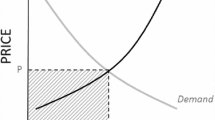Abstract
Dennett (1995) argues that memes or cultural replicators are largely autonomous of genes, and that they are fairly efficacious in determining who we are and what we do. I argue that Dennett's arguments are wrong in several aspects, which we can see by analyzing processes at appropriate levels. Specifically, I argue that it is not true that we as persons are created largely by memes, that our memes are not largely independent of our genes, and that we can use the universality of memes to make inferences about genetic predispositions. Finally, by suggesting an innate psychological mechanism for morality, I argue that morality may be largely the effect of genetic predispositions rather than autonomous.
Similar content being viewed by others
References
Alexander, Richard: 1987, The Biology of Moral Systems, Aldine de Gruyter, New York.
Baron-Cohen, Simon: 1995, Mindblindness: An Essay on Autism and Theory of Mind, MIT Press, Cambridge, MA.
Blau, Peter M. and Otis Dudley Duncan: 1967, The American Occupational Structure, John Wiley, New York.
Bohannon, Laura: 1966, 'Shakespeare in the Bush', Natural History Magazine, Aug–Sept.
Bouchard, Thomas J. Jr.: 1994, 'Genes, Environment, and Personality', Science 264, 1700.
Bouchard, Thomas J. Jr., David T. Lykken, Matthew McGue, Nancy L. Segal, and Auke Tellegen: 1990, 'Sources of Human Psychological Differences: The Minnesota Study of Twins Reared Apart', Science 250, 226–227.
Boyd, Robert and Peter J. Richerson: 1985, Culture and the Evolutionary Process, The University of Chicago Press, Chicago.
Brown, Donald E.: 1991, Human Universals, Temple University Press, Philadelphia.
Ceci, Stephen J.: 1992, '“I Know that You Know that I Know that You Broke the Toy”: A Brief Report of Recursive Awareness Among 3-Year-Olds', in S.J. Ceci, M.D. Leichtman, and M. Putnick (eds.), Cognitive and Social Factors in Early Deception, Lawrence Erlbaum Associates, Hillsdale, NJ, pp. 1–9.
Dahlbom, Bo: 1993, 'Mind is Artificial', in B. Dahlbom (ed.), Dennett and His Critics, Blackwell, Oxford, pp. 161–183.
Dawkins, Richard: 1976, The Selfish Gene, Oxford University Press, London.
Dawkins, Richard: 1993, 'Viruses of the Mind', in B. Dahlbom (ed.), Dennett and His Critics, Blackwell, Oxford, pp. 13–27.
Dennett, Daniel C.: 1991, Consciousness Explained, Little, Brown and Company, Boston.
Dennett, Daniel C.: 1993, 'Back from the Drawing Board', in B. Dahlbom (ed.), Dennett and His Critics, Blackwell, Oxford.
Dennett, Daniel C.: 1995, Darwin's Dangerous Idea: Evolution and the Meanings of Life, Simon & Schuster, New York.
Fisher, R.A.: 1930, The Genetical Theory of Natural Selection, Clarendon Press, Oxford.
Gould, Stephen Jay: 1980, 'Sociobiology and the Theory of Natural Selection', American Association for the Advancement of Science Symposia 35, 257–269.
Greeley, Andrew and Michael Hout: 1988, 'Musical Chairs: Patterns of Denominational Change', Sociology and Social Research 72, 75–86.
Holyoak, K.J., Kyunghee Koh, and Richard Nisbett: 1989, 'A Theory of Conditioning: Inductive Learning Within Rule-Based Default Hierarchies', Psychological Review 93, 315–340.
Johnson, Mark: 1993, Moral Imagination: Implications of Cognitive Science for Ethics, University of Chicago Press, Chicago.
Kagan, Jerome: 1989, Unstable Ideas: Temperament, Cognition, and Self, Harvard University Press, Cambridge, MA.
Kenny, Anthony: 1986, A Path from Rome, Oxford University Press, Oxford.
Kristof, Nicholas D. and Sheryl WuDunn: 1994, China Wakes: The Struggle for the Soul of a Rising Power, Times Books, New York.
Leekam, Susan R.: 1992, 'Believing and Deceiving: Steps to Becoming a Good Liar', in S.J. Ceci, M.D. Leichtman, and M. Putnick (eds.), Cognitive and Social Factors in Early Deception, Lawrence Erlbaum Associates, Hillsdale, NJ, pp. 47–62.
Lumsden, Charles J. and Edward O. Wilson, 1981, Genes, Mind and Culture, Harvard University Press, Cambridge, MA.
Marx, Karl: 1970, The German Ideology, International Publishers, New York.
Maynard Smith, John: 1982, Evolution and the Theory of Games, Cambridge University Press, Cambridge.
Miller, Alan S.: 1992, 'Predicting Nonconventional Religious Affiliation in Tokyo: A Control Theory Application', Social Forces 71, 397–410.
Miller, Alan S. and John P. Hoffmann: 1995, 'Risk and Religion: An Explanation of Gender Differences in Religiosity', Journal for the Scientific Study of Religion 34, 63–75.
Millikan, Ruth Garrett: 1993a, 'On Mentalese Orthography', in B. Dahlbom (ed.), Dennett and His Critics, Blackwell, Oxford, pp. 97–123.
Millikan, Ruth Garrett: 1993b, 'On Mentalese Orthography, Part 1', in R.G. Millikan (ed.), White Queen Psychology and Other Essays for Alice, MIT Press, Cambridge, MA, pp. 103–121.
Minsky, Marvin: 1986, The Society of Mind, Simon & Schuster, New York.
Peterson, Richard A. and Albert Simkus: 1992, 'How Musical Tastes Mark Occupational Status Groups', in M. Lamont and M. Fournier (eds.), Cultivating Differences: Symbolic Boundaries and the Making of Inequality, The University of Chicago Press, Chicago, pp. 152–186.
Pinker, Steven: 1994, The Language Instinct, WilliamMorrow, New York.
Pizzamiglio, Luigi, and Pierluigi Zoccolotti: 1986, 'Individual Differences: Cerebral Structure and Cognitive Characteristics', in M. Bertini, L. Pizzamiglio, and S. Wapner (eds.), Field Dependence in Psychological Theory, Research, and Application, Lawrence Erlbaum Associates, Hillsdale, NJ, pp. 27–43.
Premack, David and Ann James Premack: 1994, 'Moral Belief: Form Versus Content', in L.A. Hirschfeld and S.A. Gelman (eds.), Mapping the Mind, Cambridge University Press, Cambridge.
Remnick, David: 1993, Lenin's Tomb, Random House, New York.
Rescorla, Robert A.: 1988, 'Pavlovian Conditioning: It's NotWhat You Think It Is', American Psychologist 43, 151–160.
Ruse, Michael and Edward O. Wilson: 1985, 'The Evolution of Ethics', New Scientist 17, 50–52.
Sasaki, Masamichi and Tatsuzo Suzuki: 1987, 'Changes in Religious Commitment in the United States, Holland and Japan', American Journal of Sociology 92, 1055–1076.
Sober, Elliott: 1994, 'Did Evolution Make Us Psychological Egoists?', in E. Sober (ed.), From a Biological Point of View, Cambridge University Press, Cambridge, pp. 8–27.
Stark, Rodney and James C. McCann: 1993, 'Market Forces and Catholic Commitment: Exploring the New Paradigm', Journal for the Scientific Study of Religion 32.
Symons, Donald: 1989, 'A Critique of Darwinian Anthropology', Ethology and Sociobiology 10, 131–144.
Tooby, John and Leda Cosmides: 1989, 'Evolutionary Psychology and the Generation of Culture, Part I', Ethology and Sociobiology 10, 29–49.
de Waal, Frans: 1996, Good Natured: The Origins of Right and Wrong in Humans and Other Animals, Harvard University Press, Cambridge, MA.
Whitmeyer, Joseph M.: 1993, The Individual Basis of Social Behavior in a Mexican Community, Ph.D. dissertation, University of Washington, Seattle.
Whitmeyer, Joseph M.: 1994, 'Why Actor Models are Integral to Structural Analysis', Sociological Theory 12, 153–165.




